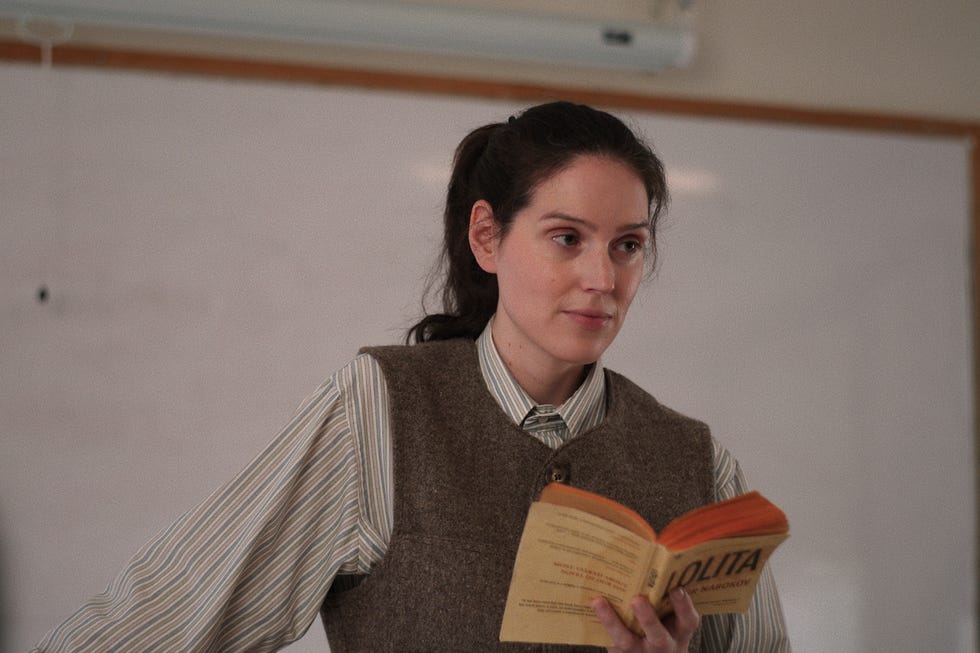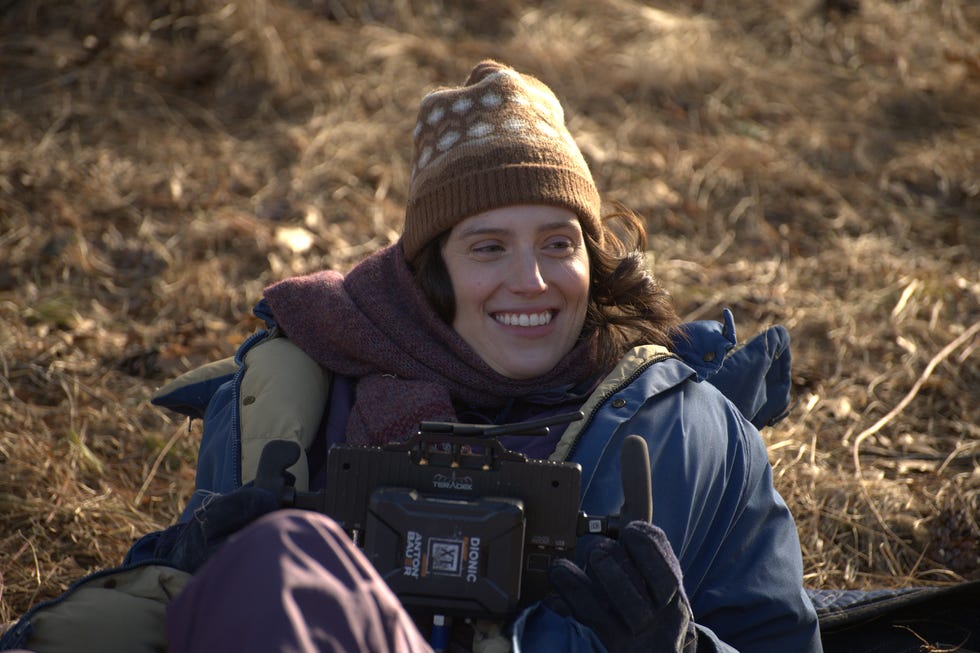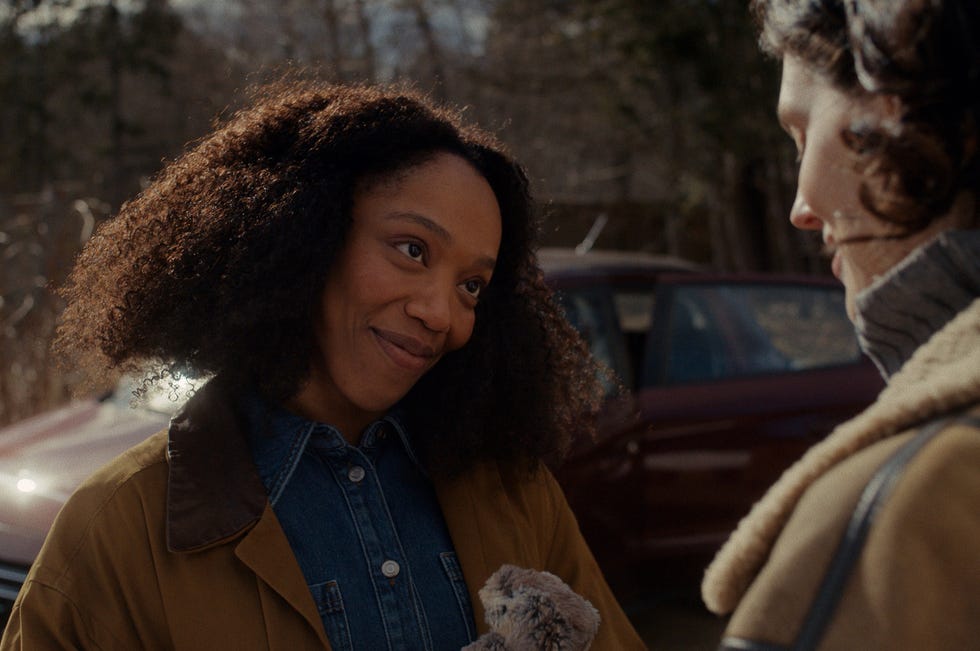How Eva Victor Tackles Trauma With Humor in <i>Sorry, Baby</i>


Eva Victor began their career in the comedy scene, going viral on TikTok and writing for satirical sites like Reductress. Subjects would range from how (not) to make small talk in an elevator to paying the check at a restaurant when you’re not sure if you’re on a date. But when it comes to their debut feature, Sorry, Baby, Victor isn’t even sure there’s a single joke in it. “Humor is always there, but it’s a very different feeling,” the writer, director, and star says.
Sorry, Baby follows Agnes (Victor), an English lit professor in a small New England town, before and after “the bad thing” that happens to her. She was sexually assaulted, though the film avoids saying or depicting it outright, forgoing stereotypical, on-the-nose portrayals. But it doesn’t minimize Agnes’s pain or trauma either. In Victor’s hands, we don’t fall into a well of despair around the incident. Instead, we spend more time in the crevices of everyday moments that make up Agnes’s complicated and beautiful life. Sorry, Baby received the Waldo Salt Screenwriting Award at Sundance, where A24 immediately scooped up the film for distribution for around $8 million.

Eva Victor as Agnes in Sorry, Baby.
Even without jokes, Victor thinks there might be three reasons why viewers laugh during Sorry, Baby. “One of them is witnessing the joy of a friendship and feeling like you’re a part of it,” they say. Victor is talking about the actual core of Sorry, Baby: the relationship between Agnes and her best friend, Lydie (Naomi Ackie), who went to college with Agnes in this small town and has since moved away. “I wanted the beginning of the film to have a lot of joy and laughter in it and to feel like it’s just these two people in this big world,” Victor says, “so that after we go through really hard things later on, we can return to a place of joy and laughter because it’s been established.”
There’s also humor in the way Agnes navigates the world; how she sneaks a cat into the grocery store or how she interacts with her kind neighbor, Gavin (Lucas Hedges). And then there’s the way the movie holds people in power accountable. “It’s kind of cathartic to laugh at them,” Victor says. At various points, the film highlights the failures of the medical system, a college’s HR department, and a courtroom during jury duty.
Victor’s approach to movies comes from a place of joy. They grew up watching the likes of A Hard Day’s Night, Top Hat, and Swing Time. They still rewatch Singin’ in the Rain, moved each time by Gene Kelly’s extended dance sequence in the middle of it. “It’s joyful and for the sake of beauty. We sometimes are told everything has to exist for a reason, and I don’t think that’s totally true,” they say.
Since then, Victor has gravitated more toward movies like 45 Years, the Three Colors trilogy, and The Double Life of Veronique. During the pandemic, Victor embarked on this self-led film education to get an idea of the kind of movie they could one day make. It then took years of preparation and confidence-building to step into the director’s chair. “I don’t think anyone’s ever going to let you make a movie,” Victor says. “You have to continue knocking on the door to make a movie. And then finally, you get to, maybe, if you’re lucky.”

Eva Victor behind the scenes of Sorry, Baby.
After Victor cracked the film’s non-linear structure and finished the script, they sent it to Barry Jenkins, Adele Romanski, and Mark Ceryak’s Pastel Productions, who signed on as producers. “I never brought it anywhere else,” Victor says. The producers set Victor up to shoot two scenes from the movie so they could get comfortable directing. Victor made storyboards and reverse-shotlisted movies they loved. By the time they got to set, Victor had compiled a massive binder (which is now used as a doorstop) of acting notes, directing notes, and storyboards for every scene.
Jenkins, aside from being a visionary artist—and one of Victor’s early post-college inspirations—proved to be an invaluable mentor. “He gifted me with this idea that what I was doing, before I ever made a film, was working out how to make a film. And that was very affirming,” Victor says. Victor took their online videos seriously, even if the tone was comical; like when they shared the many ways ladies love to brag (“I go to bed at 4:45 A.M. and I wake up at 5 A.M.”), or when they serenaded their cat after two hours apart. Jenkins saw the value in them too. “He had so much confidence in me,” Victor says. Jenkins gave them script notes, helped cast Lydie, and offered advice on set, all “intent on helping me make the film I wanted to make.”

Barry Jenkins, who produced the film, help cast Naomi Ackie as Lydie, Agnes’s friend.
Sorry, Baby couches Agnes’s experience in humor, tenderness, and warmth. Life can be dark and yet, in unexpected moments, we have to laugh. As a culture, Victor considers, we tend to mark people who’ve been through traumatic incidents as tragic figures. Victor, on the other hand, created a story that was primarily about friendship in order to give Agnes “this fighting chance of being a whole person that goes through this thing, but isn’t defined by it.”
Victor has said that the film comes from a personal place. And while no experience can be completely healing, directing gave Victor a unique power over their own story. “The act of directing myself as an actor, deciding where my body went, and then everyone in the crew and cast supporting that decision was very powerful. That part was very meaningful to me.”
After years of working out feelings of anxiety and awkwardness on Twitter, Victor found fertile ground in feature-length storytelling. They approached it differently from the beginning—with research, homework, and Oscar-winning producers—and the product became something intensely personal and, much like Victor’s video of opening a seltzer during a meeting, deeply relatable. “I really wanted the feature to breathe,” they say. “I wanted people to feel like they had to lean in to meet it.”
elle

%3Aformat(jpg)%3Aquality(99)%3Awatermark(f.elconfidencial.com%2Ffile%2Fbae%2Feea%2Ffde%2Fbaeeeafde1b3229287b0c008f7602058.png%2C0%2C275%2C1)%2Ff.elconfidencial.com%2Foriginal%2F4ef%2Fda9%2F480%2F4efda94807feeab5d72e0f9d2eec4ad6.jpg&w=3840&q=100)


